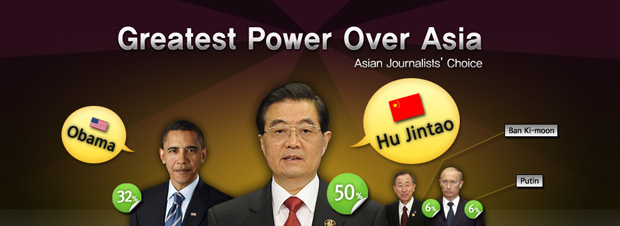Hu Jintao the most influential figure in Asia
Survey by AsiaN and AJA
Hu Jintao 50% but Obama 32%… Ban Ki-moon and Putin 6%
The survey reveals that 5 out of 10 Asian journalists think Hu Jintao of China is the most influential figure in Asia. This is 18% higher than Obama of the USA(32%). The AsiaN in association with the Asia Journalist Association(AJA) conducted the survey on 20 ~ 30 November in celebration of its launch.
Fifty journalists from 33 Asian countries including China, Japan, India and Iraq participated. According to the results, 25 journalists (50%) think Chinese President Hu Jintao is the most influential figure in Asia and only 16 journalists (32%) think US President Obama is the one. Secretary General of the UN Ban Ki-moon and Russian Prime Minister Putin followed, 3 votes (6%) each. Besides, King of Saudi Arabia Abdullah bin Abdul-Aziz Al Saud and Prince of Saudi Arabia Al-waleed bin Talal got 1 vote respectively.
US policies in Asia, unsatisfactory 52% and satisfactory 14%
Chinese policies in Asia, unsatisfactory 20% and satisfactory 40%
Among those Asian journalists, 52% said unsatisfactory for US policies in Asia but only 14% said satisfactory. On the other hand, to the question of Chinese policies in Asia, “satisfactory (40%, very satisfactory 4%)” is twice the answer “unsatisfactory (20%, very unsatisfactory 6%)”. “Neither satisfactory nor unsatisfactory” is 34% for the US and 40% for China.
To the question of the United Nations current level of performance, 20 journalists (40%), including 2 “very unsatisfactory” answered negatively which is twice the positive answer (20%). Forty per cent said neither satisfactory nor unsatisfactory.
54% said press freedom in Asia is bad
40% satisfactory for the UN performance
To the question of “press freedom in Asia”, 54% of the Asian journalists answered negatively, including 2% of “very bad”. This is three times the positive answer 18% whereas neutral is 28%.
Meanwhile, 66% of the journalists agree with the necessity for integration of Asia, such as the European Union. 33 journalists (66%) said ‘definitely necessary’ and 8 journalists (16%) said ‘necessary’. However, 28% gave a negative answer and 3 journalists (6%) said ‘I don’t know’.
66% agreed with the idea of Asian Union
Difference in religion and culture is a major obstacle
To the question of “an obstacle to stronger integration of and cooperation between Asian countries”, the biggest number gave an answer of disparity in economies, 36%. Disparity in religions and culture (26%), security issues (24%), and dictatorial regimes (16%) followed.
To the question of “the most significant problem of the world with seven billion population”, most journalists (40%) answered environmental destruction. Shortage of food (38%) and welfare crisis for the aged (14%) followed. Also, civil war, migration, job insecurity, disparity in income and new diseases were pointed out.
To the question of solutions to climate change, 25 journalists (50%) answered “refrain from consuming materials that emit carbon dioxide”. “Reduce the salce of industrial development (24%)” and “Plant more trees (22%)” followed.
The journalists participated in the survey are from 33 different countries’ newspaper, TV and news agency, including Bangladesh, Australia, Cambodia, China, Egypt, Indo, Indonesia, Japan, Malaysia, UAE, Kuwait, Thailand, Taiwan, Pakistan, Singapore, Uzbekistan, Vietnam, Mongolia, Laos, the Philippines, Iran, Nepal, Bhutan, Kazakhstan, East Timor, Iraq, Sri Lanka, Korea, Burma, Afghanistan, Jordan and Syria.
By gender, male journalists are 38 and female journalists are 12. By age, 5 in the 20s, 10 in the 30s, 15 in the 40s, 12 in the 50s and 8 in the 60s. By religion, Muslims are 16, Christians are 9, Buddhists are 8, Hindus are 8 and journalists with no religion are 9.

























































